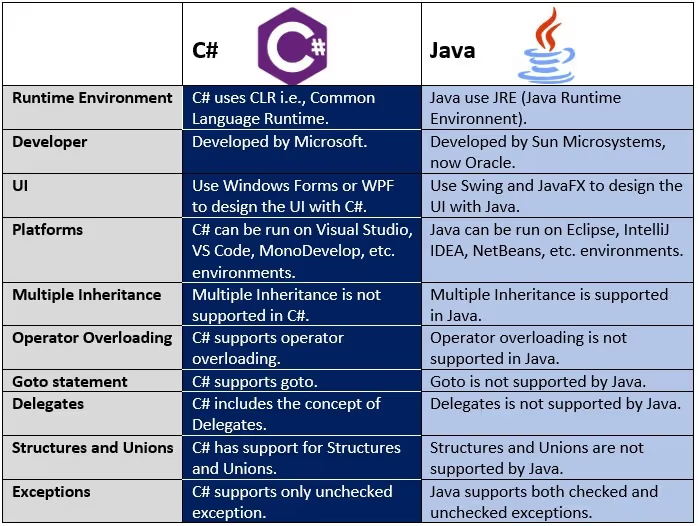C# vs Java! Understand the differences and learn more about what makes them special in their own way. Get to know the best way to hire C# and Java developers without stepping out of your comfort zone!


There's no arguing C# vs Java are among the most important programming languages, each having its strengths. Deciding between them depends on factors like project needs, existing infrastructure, and what developers prefer. Both languages have strong communities, and support, and can adapt to the changing needs of modern software development. To make the right choice, developers need to consider the specific advantages and trade-offs of C# and Java that align with their project goals and organization. Choosing the right programming language is crucial in the constantly changing field of software development. C# and Java are well-established in object-oriented programming, serving a variety of applications. This comparison aims to explore the details of C# and Java differences, helping modern developers make informed decisions based on their project requirements. We will also assist you on how you can make sure you hire the most skilled developers from LATAM!

There may be a lot of C# and Java differences but each of them comes with its own benefits and uses that make them useful for various and specific types of projects. In this section, we carry out an in-depth C# and Java comparison for our readers!
Developed by Microsoft, C# (C-Sharp) made its debut in 2000 as part of the .NET initiative. It was designed to be a versatile language for building Windows applications, with a strong emphasis on simplicity and developer productivity. Over the years, C# has evolved into a multi-paradigm language, supporting imperative, functional, and object-oriented programming.
On the other hand, Java, conceived by James Gosling and his team at Sun Microsystems in the mid-1990s, was intended for creating platform-independent software. Known for its "Write Once, Run Anywhere" mantra, Java became a leading language for enterprise applications. Its ownership transitioned to Oracle Corporation in 2010, solidifying its place in both web and enterprise development.
C# boasts a syntax heavily influenced by C and C++, making it familiar to developers with a background in these languages. It incorporates modern features like lambda expressions, async/await for asynchronous programming, and LINQ for querying data structures. The introduction of nullable reference types in recent versions enhances code safety, aiding developers in catching null-related errors at compile time.
Java's syntax is known for its readability and simplicity. It follows the C-style syntax, making it accessible to developers from various programming backgrounds. While it lacks some of the syntactic sugar present in C#, it compensates with a robust set of libraries and frameworks. Java's recent versions have introduced features like lambda expressions, the Stream API for functional-style programming, and pattern matching, aligning it more closely with modern language trends.
C# has historically been associated with the Microsoft ecosystem, focusing on Windows development. However, with the advent of .NET Core (now .NET 5 and later), C# has become cross-platform, supporting development on Linux and macOS. The .NET ecosystem provides a wealth of libraries and tools, fostering a vibrant community and enabling developers to create a wide array of applications, from desktop to web and mobile.
Java's "Write Once, Run Anywhere" philosophy has been a cornerstone of its success. The Java Virtual Machine (JVM) allows Java code to run on any device that has a compatible JVM implementation. Java's ecosystem is vast, with a plethora of libraries and frameworks, contributing to its popularity in enterprise settings. The Jakarta EE platform, formerly Java EE, supports robust enterprise application development.
C# benefits from the Common Language Runtime (CLR), which includes a just-in-time (JIT) compiler. This compilation strategy enables C# to achieve performance comparable to languages like C++ while maintaining a higher level of abstraction. Automatic memory management through the garbage collector simplifies memory handling for developers, contributing to a more secure and productive coding experience.
Java's performance has improved over the years, thanks to enhancements in the JVM and just-in-time compilation. While it might not match the raw performance of languages like C or C++, Java's portability and extensive libraries make it a preferred choice for applications where performance is not the sole consideration. Java's garbage collector manages memory automatically, mitigating common pitfalls associated with manual memory management.
Visual Studio, Microsoft's integrated development environment (IDE), is the go-to tool for C# development. It provides a rich set of features, including code completion, debugging, and integrated testing. Visual Studio Code, a lightweight alternative, is also widely used, offering cross-platform support.
Java developers often rely on IntelliJ IDEA, Eclipse, or NetBeans for their integrated development environments. IntelliJ IDEA, in particular, has gained popularity for its powerful features, intelligent code assistance, and support for various Java frameworks. These tools contribute to a seamless development experience, with extensive debugging and profiling capabilities.
C# employs a managed memory model, relying on the Common Language Runtime's (CLR) garbage collector for automatic memory management. The garbage collector in C# uses a generational approach, dividing objects into three generations based on their lifetime. This approach, coupled with features like the using statement for deterministic resource cleanup, ensures efficient memory utilization without burdening developers with manual memory management concerns.
Java, too, embraces a managed memory model with automatic garbage collection facilitated by the Java Virtual Machine (JVM). The garbage collector in Java employs various algorithms, such as the generational garbage collector, parallel collector, and the Garbage-First (G1) collector. Developers benefit from Java's memory efficiency, though some applications may experience occasional pauses during garbage collection, a trade-off for its automatic memory management.
Since 2014, we've helped North American companies hire excellent software engineers from Latin America. Joining Blue Coding will help you become part of a helpful, effective, and committed community. Our remote work setup is super convenient, opening up countless opportunities for you. We believe in honesty, fairness, and respect, creating a friendly and diligent work environment. Stay in the loop about the latest tech trends and news by checking out our LinkedIn and Instagram or join the team today!
Subscribe to our blog and get the latest articles, insights, and industry updates delivered straight to your inbox